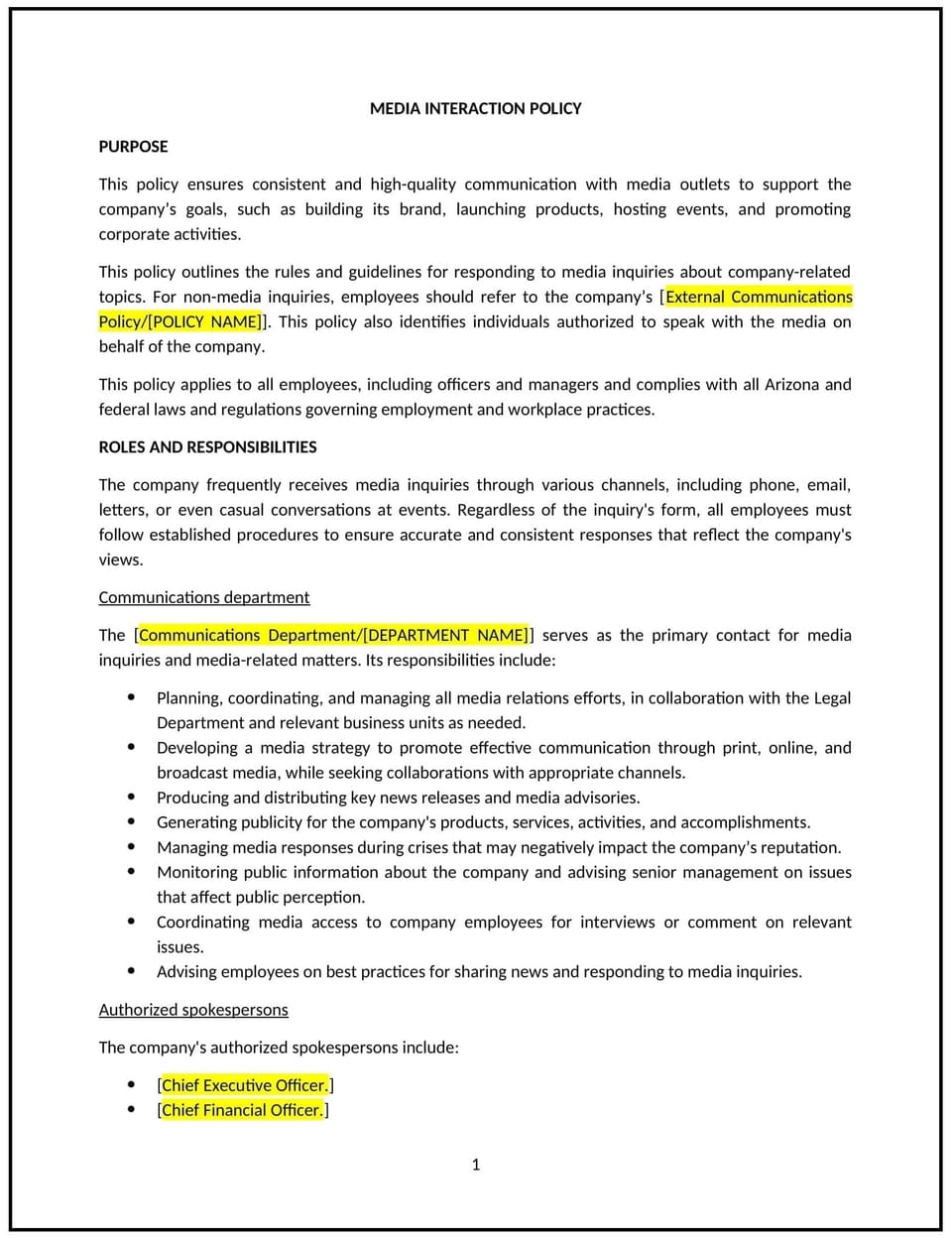Media relations policy (Arizona): Free template

Media relations policy (Arizona)
In Arizona, a media relations policy provides businesses with guidelines for managing interactions with media outlets. This policy helps ensure that all communications with journalists, reporters, and other media representatives are consistent, professional, and aligned with the company’s goals and messaging.
This policy outlines procedures for responding to media inquiries, designating spokespersons, and managing press releases. By implementing this policy, Arizona businesses can safeguard their reputation, promote transparency, and ensure compliance with communication standards.
How to use this media relations policy (Arizona)
- Designate spokespersons: Identify specific individuals authorized to communicate with the media on behalf of the company, such as senior executives or public relations personnel.
- Establish approval processes: Require all media statements, press releases, and interviews to be reviewed and approved by the designated team or leadership.
- Provide response procedures: Outline steps for handling media inquiries, including the process for forwarding requests to the appropriate spokesperson.
- Include crisis communication protocols: Develop guidelines for managing media communications during emergencies or reputational challenges.
- Monitor media coverage: Track and review media reports to ensure accurate representation of the company and address any inaccuracies promptly.
Benefits of using a media relations policy (Arizona)
This policy offers several advantages for Arizona businesses:
- Protects reputation: Ensures all media communications reflect the company’s professionalism and values.
- Promotes consistency: Standardizes messaging across all interactions with media outlets.
- Enhances transparency: Provides clear and accurate information to the public and media representatives.
- Supports compliance: Aligns with Arizona laws and industry regulations regarding public communication and media engagement.
- Improves efficiency: Streamlines media relations processes, reducing delays and errors in responses.
Tips for using a media relations policy (Arizona)
- Address Arizona-specific considerations: Include state-specific topics, such as local community involvement or industry trends, in media messaging.
- Train spokespersons: Provide media training to designated representatives to ensure confident and effective communication.
- Use technology: Leverage tools for monitoring media coverage and managing press release distribution.
- Include social media: Extend the policy to cover public statements made through social media platforms to maintain consistency.
- Review periodically: Update the policy to reflect changes in media practices, company goals, or legal requirements.
Q: Who is authorized to speak with the media under this policy?
A: Only designated spokespersons, such as senior executives or public relations personnel, are authorized to communicate with media outlets on behalf of the company.
Q: What steps should businesses take to respond to media inquiries?
A: Media inquiries should be forwarded to the designated spokesperson, who will review the request and provide an approved response in line with company messaging.
Q: How can businesses manage media interactions during a crisis?
A: The policy should include a crisis communication plan outlining procedures for preparing statements, coordinating with leadership, and addressing media inquiries promptly and accurately.
Q: What is the role of media monitoring in this policy?
A: Media monitoring helps track coverage of the company, ensuring accurate representation and identifying any issues that require clarification or correction.
Q: How does this policy support compliance with Arizona regulations?
A: The policy ensures that all media communications align with state and federal laws, minimizing risks of misrepresentation or legal disputes.
This article contains general legal information and does not contain legal advice. Cobrief is not a law firm or a substitute for an attorney or law firm. The law is complex and changes often. For legal advice, please ask a lawyer.


